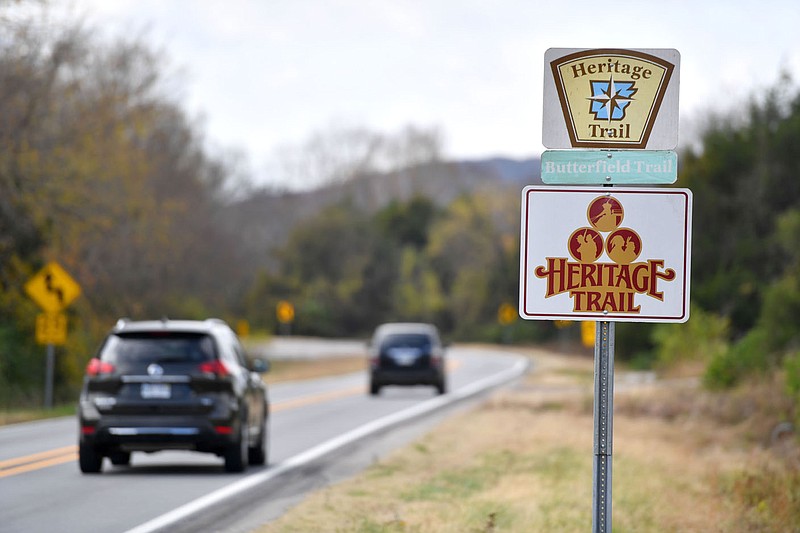The entire route of the Butterfield Overland Trail has been designated a national historic trail by Congress, including two portions that cross Arkansas.
Republican U.S. Sen. John Boozman of Rogers sponsored the legislation, which he has shepherded through Congress in stages since he was a member of the House.
"The Butterfield Trail helped facilitate America's westward expansion and is a symbol of the pioneering spirit we still seek to embody. Designating it as a national historic trail will help future generations identify it with our nation's growth and development," Boozman said.
"I'm pleased we were able to work in a bipartisan way to build the support necessary to approve it in the Senate. I encourage the House to follow suit and will continue championing this proposal until we get it across the finish line," he said.
The route, operated from 1858-1861 by the Butterfield Overland Mail Company and also known as the Butterfield Stage, was used to transport U.S. mail and passengers between St. Louis, Memphis and San Francisco, serving as the route of the longest stagecoach operation in history. It became known as the "ox-bow route" due to its curved path extending for about 3,553 miles in eight states: Missouri, Tennessee, Arkansas, Oklahoma, Texas, New Mexico, Arizona and California.
Planners in Northwest Arkansas and the River Valley have approved portions of the route for inclusion of the Butterfield Trail Experience, a bicycle touring route that parallels the historic trail between Jefferson City, Mo., and Fort Smith, about 500 miles in total when complete.
Elizabeth Bowen, with the Northwest Arkansas Regional Planning Commission said the designation will preserve the region's history, culture and heritage for future generations.
"This 'Trail' has long been looked at and utilized in Northwest Arkansas for our transportation network through the Heritage Trail Plan," Bowen said. "This and other historical trails are the backbone for our active transportation planning that includes connecting people to our heritage, cultural and recreation assets. This designation will further these efforts."
Bowen said Marilyn Heifner and John McLarty with Heritage Trail Partners have worked on getting the designation for the past 19 years.
"I can't tell you how excited I am. I had almost given up hope," Heifner said Thursday. "We started this journey in March of 2004. We thought it would be a slam dunk."
It wasn't. Rules changed, studies were required, funding had to be found and legislation had to be passed, which all took time, Heifner said.
"It's been a long journey," she said.
Heifner said the designation along with the bike route should help tourism in the region.
Missouri has a 250-mile route between Jefferson City and Springfield and is working on the portion south of Springfield to the Arkansas line.
"We are thrilled after all of the work undertaken by Senator Boozman and many others that the well-deserved national designation of this historic trail will be achieved," said Reese Brewer, director at the Frontier Metropolitan Planning Organization in Fort Smith. "We stand ready to support not only Senator Boozman's efforts for the Butterfield Overland Trail, but also future greenways, routes and corridors associated with the Butterfield Overland Trail."
The routes from St. Louis and Memphis merged in Fort Smith, and the Butterfield Overland Express stagecoaches traveled through much of Arkansas. Stagecoaches made stops between Memphis and Fort Smith in St. Francis, Prairie, Lonoke, Faulkner, Conway, Pope, Yell, Logan and Franklin counties. The northwest route that came out of Missouri included stops in Benton, Washington and Crawford counties before crossing the Arkansas River and entering Sebastian County at Fort Smith.
Four segments of the roads the Butterfield Overland Express traveled in Arkansas have been listed on the National Register of Historic Places. The Potts home, a well-preserved Arkansas way station for the Butterfield Express, is still standing in Pope County and is maintained as the Potts Inn Museum by the Pope County Historical Foundation. There's also the Fort Smith National Historic Site.
In Northwest Arkansas, Fitzgerald Station in Springdale is an original building associated with the trail. There are also a good number of buildings that were standing at the time in Fayetteville, including the Walker-Stone House, the Ridge House, and the Headquarters House.
Boozman amended the original legislation to preclude any potential effect on energy development, production or transmission as a result of the trail designation and has worked with senators who would see the trail pass through their states to ensure they support the effort, according to the release.


